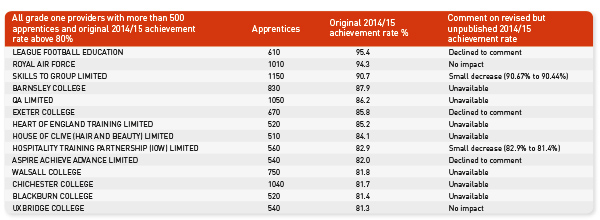As FE Week launches #saveourapprenticeships, our editor Nick Linford explains why he passionately believes loans should be written-off for undeserving victims where training providers go bust
FE loans are a relatively new way to fund courses, but through no fault of their own adults are already being left with large government debts for cancelled courses.
The short-term solution, to write the debt off, is both simple and obvious. But it is important to also learn from why and how the loans were introduced.
Before August 2013, people aged 24 or over who started a vocational course at level three or above would have typically shared the cost with the government.
For example, someone looking to change career and get qualified as a personal fitness instructor might pay £1,500, and the Skills Funding Agency on behalf of the government would pay the other £1,500.
An advanced learning loan, as these were named, isn’t classed as government expenditure
The college or training provider would then have £3,000 to deliver a level three qualification in personal fitness instruction.
This co-investment funding model as it’s known, where the costs are shared between the learner and the government, had been working well for many years.
However, the government obsession with cutting departmental budgets by up to 40 percent changed all that, when they converted both the £1,500 learner and £1,500 government contribution into a loan.
An advanced learning loan, as these were named, isn’t classed as government expenditure, so as far as the Treasury is concerned a budget cut had been achieved.
In the example above, the full £3,000 is paid to the college or training provider by the Student Loans Company.
The learner pays nothing until after the course finishes. And, like a loan to study at university, they only have to start repaying once they are earning over £21,000, with a relatively low interest rate.
So assuming the learner is still willing to take out a £3,000 income contingent loan, the provider still receives their funding and the provision continues.
Robert Halfon should now ensure learners let down by a negligent SFA should also have their loan written off
So far so sensible, but now comes the insanity.
The SFA gave people running companies, with no history of receiving public funding, access to millions in loans cash from the Student Loans Company.
These people would fill out online forms with the SLC to receive the funding, and often pay other companies to deliver the training via subcontractors.
The sadly predictable outcome of giving a few individuals access to millions in public funding is a growing list of liquidated companies, and thousands of learners with debts for courses they are unable to finish, as increasingly reported in the pages of FE Week.
The SFA has slowly begun to address the problem, by tightening up the way it sets and increases access to loan funding, as well as gradually banning the use of subcontracting.
But it also needs to acknowledge the early failings, by changing policy towards learners left with debts for courses they cannot complete.
Cancelling the loans for these learners would not only end an injustice, it should also be a simple policy to implement, given this is already what happens for others.
Learners using loans for level three Access to Higher Education qualifications don’t have to pay them back, if they go on to pass a degree. This is a policy the then skills minister, John Hayes, implemented.
The current skills minister, Robert Halfon, should now ensure learners let down by a negligent SFA should also have their loan written off.
It really should be an easy policy change to end an obvious injustice.
Over to you Mr Halfon.
Article first published on the NCFE blog.


